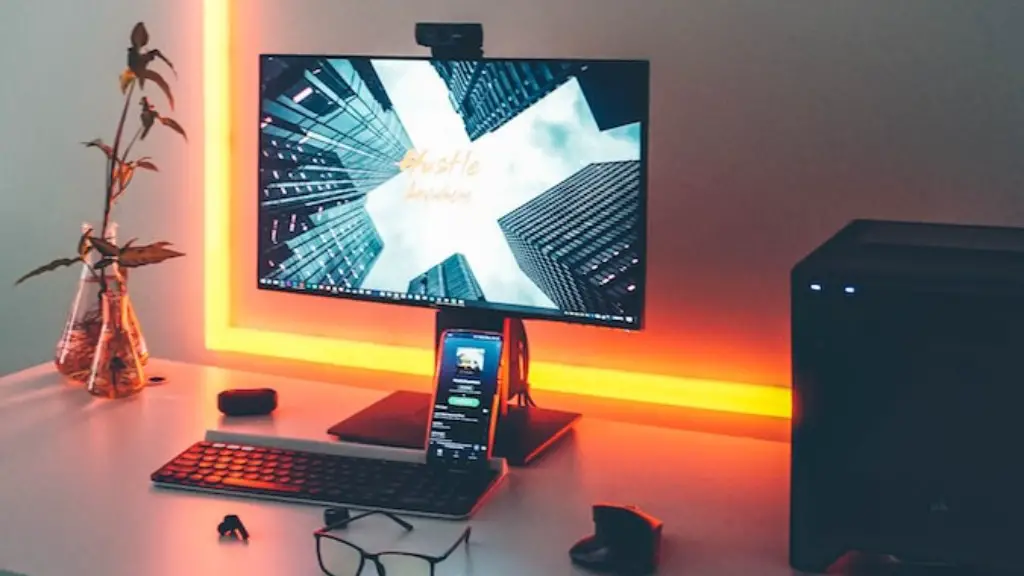Whether you’re a competitive esports professional or a casual PC gamer, the type of monitor you use can make a big difference to your enjoyment and performance. While the market is saturated with gaming monitors offering a variety of features, certain key elements should be considered when looking to make a purchase. In this article, we’ll discuss what gaming monitor to get and the features you should look out for.
The most important feature to look for when buying a monitor is the response time. Ideally, a gaming monitor should have an input lag of less than 16ms. This ensures that there is no delay between the time you make a move and the time it is displayed onscreen. Unfortunately, low-end monitors tend to have an input lag of more than 16ms, so it is important to bear this in mind.
The refresh rate is another key consideration; higher refresh rates produce smoother and faster gaming experience. Monitors with a refresh rate of 144 Hz and above are generally suitable for gamers and provide the best gaming experience; anything less could leave you vulnerable and lagging behind.
The size of the monitor is another factor to bear in mind. While it is tempting to go for a large screen with the intention of enjoying a more immersive gaming session, bear in mind that a bigger screen will require more powerful graphics processing power. If you don’t have a powerful graphics card, you should consider a 27-inch monitor – which is the ideal size for gaming.
When buying a gaming monitor, ensure that it has low blue light ratings. Not only is this better for your eyes and better for your sleep, but it can also help to reduce the lag time between your input and the time it is displayed onscreen. Monitors with a low blue light rating produce less glare and sharper contrast, making them less tiring to look at in the long run.
Lastly, the type of panel you choose for your gaming monitor is also important. TN panels tend to be the cheapest, but they lack the brightness and colour accuracy of VA and IPS panels. VA panels offer the best contrast ratios, while IPS panels offer the most accurate colours and viewing angles. Depending on your budget and your gaming needs, choose the panel that best suits you.
Display Resolution
When buying a gaming monitor, one of the most important features to consider is display resolution. Higher resolutions (such as 4K or 1440p) provide a more detailed and immersive gaming experience, but are also significantly more demanding on your hardware. A 1080p monitor is capable of providing a great gaming experience and is recommended for gamers with a lower budget. If you are looking for a more detailed gaming experience, consider investing in a 1440p or 4K monitor.
Also, bear in mind that higher resolutions require more powerful graphics cards to provide a smooth gaming experience. Make sure that your graphics card can handle the resolution you choose, lest you find yourself lagging or stuttering in-game. If you are uncertain, opt for a 1080p monitor until you can upgrade your hardware.
Aspect ratios are another important factor to consider when buying a gaming monitor. Aspect ratios refer to the shape of the display; most gaming monitors are either 16:9 or 21:9. 16:9 is the most commonly used aspect ratio and can be used for a variety of different tasks – including streaming and gaming. 21:9 aspect ratios provide a more immersive gaming experience, but some games may not support this.
Finally, keep an eye out for additional features, such as adaptive sync and HDR. These features can enhance your gaming experience and provide better visuals; however, they come at a cost and cannot be taken advantage of without powerful graphics cards.
Refresh Rate and Response Time
Refresh rate is the number of times per second that the monitor can display a new frame. The higher the refresh rate, the more frames it can display per second and the smoother the gaming experience will be. Monitors with a refresh rate of 144 Hz and above are better suited for competitive gaming, while 60Hz will suffice for more casual gamers. Some monitors even offer a refresh rate of up to 240Hz, although they may come at a higher price.
Response time refers to the amount of time it takes for a monitor to update the image after receiving an input. Lower response times help reduce lag and are beneficial for faster-paced games. Monitors with an input lag of less than 16ms are generally great options for gaming; however, bear in mind that response time is affected by the refresh rate. Lower refresh rates tend to have higher response times and vice versa.
It is also important to remember that monitors with higher refresh rates are more demanding on your hardware; as such, make sure that your graphics card can handle a higher refresh rate before investing in a more expensive monitor.
Finally, be sure to look out for adaptive sync technology, such as G-Sync and Free-Sync. These technologies help reduce screen tearing, stuttering and ghosting, providing a more seamless gaming experience.
Features to Consider
In addition to refresh rate and response time, there are a number of other features to consider when buying a gaming monitor. Some of the most important features include:
- Size: Monitors range from as small as 21-inches up to 34- or even 43-inches. Larger monitors provide a more immersive gaming experience, but require more powerful hardware to run effectively.
- Panel type: TN, IPS, and VA panels all offer different levels of colour accuracy, brightness, and viewing angles. VA panels are the best option for contrast ratios and IPS panels offer the best colour accuracy.
- HDR: If your graphics card supports HDR, investing in a gaming monitor with HDR capabilities can provide an enhanced gaming experience with improved visuals.
- Connectivity: Ensure that the gaming monitor has the necessary ports for your hardware; for example, if you wish to connect dual displays, be sure to look for monitors with dual HDMI ports.
Additional Factors
There are a few other things to consider when buying a gaming monitor, such as ergonomics and budget. Monitors with adjustable height and tilt/swivel can help with posture and reduce fatigue, while also making it easier to reach your peripherals. Additionally, consider your budget – gaming monitors range drastically in price, and can cost anything from just a few hundred dollars to several thousand. While more expensive monitors may include additional features, more affordable monitor can still offer great gaming performance.
Additionally, if you are looking for a larger gaming monitor and are unable to run higher resolutions (such as 4K), consider an Ultrawide monitor. These monitors have a much larger aspect ratio than traditional 16:9 monitors and provide a much more immersive gaming experience.
Warranty and Customer Support
Finally, depending on your budget, consider investing in a gaming monitor with a good warranty and customer support. Many manufacturers offer long warranties on their products, giving you peace of mind in the event that your monitor fails. Additionally, some manufacturers also provide customer support services, such as phone or email support – reducing your chances of having to return your monitor if something goes wrong.
In conclusion, when buying a gaming monitor, it is important to consider a a variety of factors, such as display resolution, aspect ratio, refresh rate and response time, panel type, and connectivity. Additionally, consider additional features such as HDR, ergonomics, budget, warranty, and customer support. Since each monitor has unique features it offers, it’s important to take your time and research the best monitor for your gaming needs.

